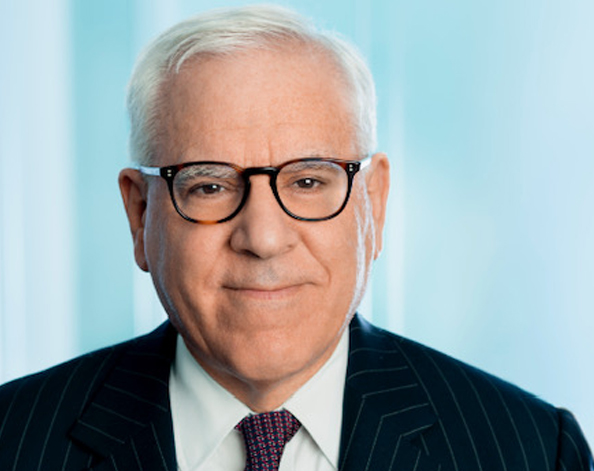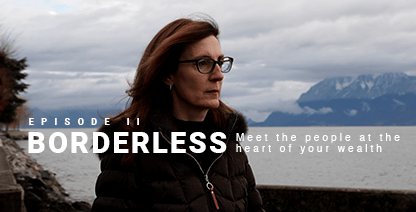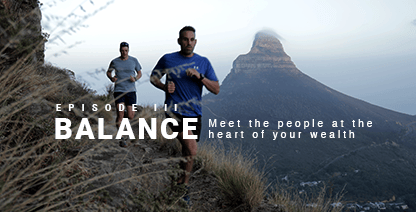Do you want to give us feedback on this webcast?
David M. Rubenstein has an impressive CV, including the co-founding of private equity firm The Carlyle Group, working as an adviser to former US President Jimmy Carter and hosting two business shows on Bloomberg TV, Peer to Peer and Leadership Live. He’s also one of the US’s leading philanthropists and sits on numerous boards and foundations.
In his various roles, he’s able to draw on the insights and expertise of many of the people who shape policies and opinions, whether they are business leaders, politicians, health experts or leaders of civil society.
In the tenth episode of Investec Wealth & Investment's webcast series "Marketing and investing in a time of Covid-19" he shared some of his insights with journalist Nozipho Tshabalala on topics as wide-ranging as the Covid-19 pandemic, leadership and the upcoming US presidential election.
Prefer to listen on the go?
The audio of the full conversation with David M. Rubenstein is available as a podcast here, or wherever you stream your podcasts.
Subscribe to Investec Focus Radio SA
Vaccines take time
On solving the Covid-19 health crisis, Rubenstein says much will depend on how quickly a vaccine can be developed and distributed.
“I am reasonably optimistic that by early next year one or more vaccines will be deemed to be healthy and effective,” he says. “However, we still have to make certain that they are produced and that they are distributed and that takes some time. Vaccines are complicated things to produce – the shortest time ever to produce a vaccine was the mumps vaccine which took four years start to finish.”
This means governments and society need to do a better job managing the crisis until such time as a vaccine is readily available.
“I do think we've got to do a better job, certainly in the US, in social distancing, wearing masks and recognising that this is a virus that will kill you.”
The economic impact of the pandemic and the "Covid crater"
Looking at the economic and social effects of the pandemic, he says just as some sectors are likely to be harder hit than others, so some economies will feel the impact more than others.
“In the US we've been able to deal with it [high unemployment] because we borrowed a lot of money and that helped shore up the economy. In other parts of the world, the ability to borrow enormous amounts of money and deal with it is not there,” he notes.
“In emerging markets, the situation is going to get worse before it gets better because the disease has not yet completely spread and I'm not sure they're going to have the health facilities and the financial resources to deal with it.”
There will be long-term effects too, he says. “Clearly people are not going to travel or gather quite as much for some time. People are going to learn how to work remotely and sadly some people will find that their jobs are seen as being not necessary.”
Rubenstein worries about the impact on income inequality, particularly what he calls the “Covid crater”, whereby some people will not be able to find work in the future.
“Income inequality in the US is as bad as it's been since the Great Depression, but it's getting worse than even that now and that's because not only do we have income inequality and a lack of social mobility, we have what I call the Covid crater – those people that don't have technology resources, don't have access to the internet or work in jobs that just are not going to be essential going forward.”

The word philanthropy is derived from an ancient Greek word that means loving humanity. It doesn't mean billionaires writing cheques; it means everybody doing what they can to help other people and it doesn't have to be with money.
Lessons from the leaders
Through his two Bloomberg TV shows, Rubenstein regularly discusses the issues of the day with some of the world’s leaders in different spheres. In these interactions with the likes of Warren Buffett, Jeff Bezos and Bill Gates, he is able to question them on the sorts of things that make them tick.
Rubenstein says people who have become successful have certain traits in common:
“They learn how to persist; they are willing to overcome failure; they have a vision of where they want to go; they're able to focus their energies on certain areas and make themselves an expert in that area; they learn how to get along with other people and to share the credit; they tend to be highly ethical; they tend to be (with obvious exceptions) relatively humble because they recognise they had a lot of luck and other good fortune along the way.”
They’re also good communicators, not just through words but also in the way they lead by example.
“Most importantly, they are people who want to do something useful with their lives other than just making money or being famous. They want to give back to society and people that want to do that I think are generally going to be very effective leaders.”
Giving back
Giving back to society is something that resonates with Rubenstein as a philanthropist. “The word philanthropy is derived from an ancient Greek word that means loving humanity. It doesn't mean billionaires writing cheques; it means everybody doing what they can to help other people and it doesn't have to be with money,” he says.
“You can help other people with your energy, your time, your ideas. You can always make more money if you're inclined to do so but you don't get more time in life. So, I encourage people who are not fabulously wealthy to find something they're interested in. If they can give some money fine, but give their time, their energy and their ideas.”
Nonetheless, he says one should recognise that the problems of the world are “so spectacularly big” in some cases there isn't enough volunteer help or enough philanthropic wealth to solve all of them. Governments exist to solve these problems, he says “but I do think philanthropy can make a difference”.
He cites the work done by the Gates Foundation in trying to eliminate certain diseases or what Jimmy Carter did in trying to eliminate river blindness or Nigerian businessman Aliko Dangote who works with Bill Gates to try and eliminate malnutrition and other ills. “I think it's a sign that philanthropy can be important, but it can't solve all the problems,” he says.
Trust us to manage your wealth today
Trump vs Biden
On the upcoming US presidential election, he cautions not to read too much into polls four months ahead of the event. Ultimately, he says, the election is essentially a referendum on the President.
“Whether Joe Biden says something or does something is less relevant than how Donald Trump is handling the economy and the healthcare crisis. And when presidents have good economic times, they tend to get re-elected. When presidents didn't have good economic times – like Jimmy Carter, George Herbert Walker Bush, Gerald Ford all running for re-election in a recession – they lost,” he explains.
“It's been more than a hundred years since we've had a president run for re-election and win during a time of recession so Trump clearly has an uphill battle right now, but it could turn around.”
Rubenstein says that if Biden were to be elected, he would probably stick to a traditional Democratic foreign policy. “This means he will re-engage with the allies in Europe and allies around the world try to deal with the China tensions as best he can, try to re-engage with the Iranian situation in terms of the agreement we had, re-engage with the Paris Climate Accord and probably try to strike up some renewed Trans-Pacific partnership that deals with trade in Asia,” he notes.
China of course, will loom large in policy, whoever gets elected. “I think throughout the campaign you're going to see a lot of China bashing. There are no votes in the US for saying China's wonderful, particularly after Covid-19,” he says.
“If Biden is elected, I think he will probably try to have a closer relationship [with China under Trump's presidency], but there will be more emphasis on human rights. If Trump is elected, I suspect you'll see the usual confrontation and then making it up, and then confrontation then make-up that we've seen before."
About the author

Patrick Lawlor
Editor
Patrick writes and edits content for Investec Wealth & Investment, and Corporate and Institutional Banking, including editing the Daily View, Monthly View, and One Magazine - an online publication for Investec's Wealth clients. Patrick was a financial journalist for many years for publications such as Financial Mail, Finweek, and Business Report. He holds a BA and a PDM (Bus.Admin.) both from Wits University.
Get Focus insights straight to your inbox
Please refer to the W&I Webinar Disclaimer and Data Protection Notice for the terms and conditions governing W&I webinars.














